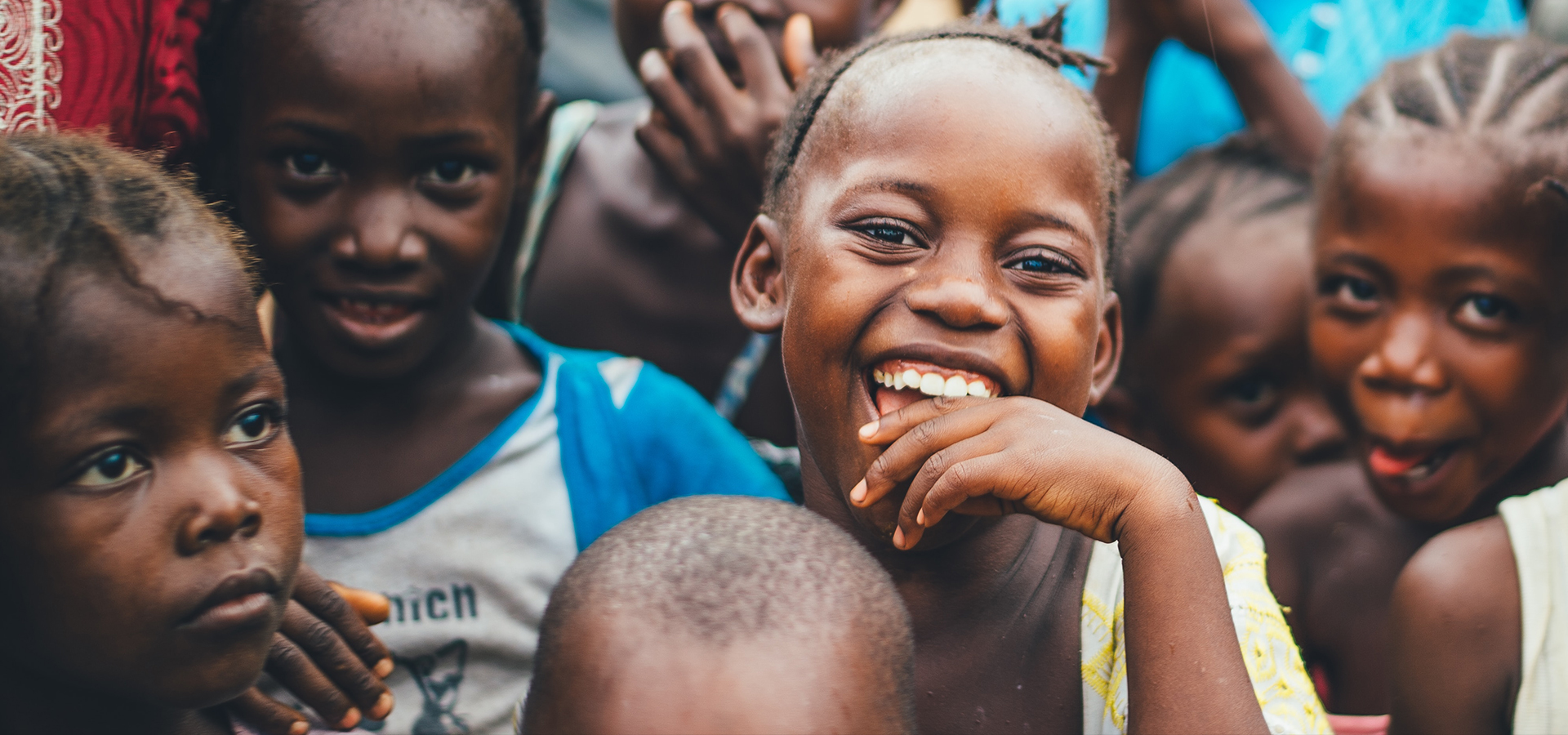
Creating A Force For Good: An Interview with Jose Pierre
We recently had the opportunity to talk to our guest author Jose Pierre about his work with The Children Heritage Foundation. Here are some uncommon truths to apply to life and business. It is what we make out of what we have, not what we are given, that separates one person from another. “What’s in our hands?” is a question we challenge ourselves on a daily basis, which motivates us to place the needs of others first. One should never judge another unless one truly understands the experience of the individual being judged.
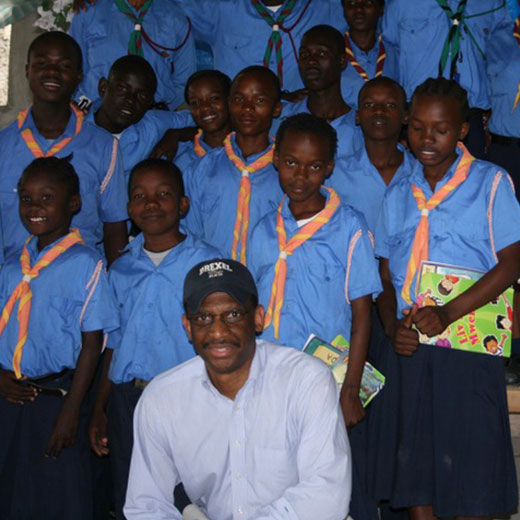
Here’s the full interview:
Bulldog Drummond (BD): Tell us about what you do for work.
Jose Pierre (JP): I work as the CEO and Founder of Marketware International. Our company has delivered financial applications for the largest banks and brokerages in North America and several leading Fortune Global 500 Companies—currently focusing on strategic consulting in financial services and marketing AI-driven solutions for financial market analytics with our alliance. In addition, my wife, Bernadette Pierre, and I are Co-founders of the Children Heritage Foundation (tCHF), a 501(c)(3) non-profit organization. Since its inception, tCHF has supported educational activities in the South of Haiti starting with an IT Program for baccalaureate students in partnership with Globe University in St. Paul, Minnesota and hosted at the American University of the Caribbean (AUC). Today, tCHF continues to support a growing number of elementary school students in Port-au-Prince and in the Les Cayes suburb village of Simon, providing school tuitions, meals, computer literacy and other substantive support. We are diligent in our efforts throughout the year to raise awareness of the problems children in Haiti are facing and to seek out sponsors and support from corporations and individuals. This keeps us quite busy. We believe that to properly address Haiti’s economic and social inequality with the rest of the world requires measures that account for the important role of education. Our goal is to help enhance the lives of the young people in Haiti by providing access to education, not charity.
BD: What gets you fired up about what you get to do every day?
JP: Starting every day with a goal to make a difference in someone’s life and finding ways to make that a reality. Opportunities to touch other people’s lives are all around us, only when we stop to listen to the needs of others through simple actions—a sincere hello, active listening, compassion or show of interest in what matters to them—can we enhance people’s lives as well as ours. I also seek to live a purposeful life daily, through unwavering faith in God, not giving up on my goals. The road to success, personal or business, is paved with challenges and is certainly not for the faint of heart, but when I think of the many kids we support in Haiti, the harsh conditions they live through daily and our commitments to them and their communities, I know that I cannot relent, for whatever issues I may have pales in comparison, so I stay the course. Each day brings new ideas to consider towards our objective to make a difference “one child at a time”.
BD: What moment or experience in your life made you who you are today?
JP: The series of moments and events in my life have molded who I am today. Hard work and the belief that dreams and goals could be achieved were passed on by our parents and are still essential to our family today. It is a blessing that young children can grow up poor and not realize that they are missing anything, oblivious of their true condition—that was the case for my sister and me. As we grew up, we learned that something was different. We were growing up and recognizing that there was a larger world beyond our community. Still at a young age, in the midst of our learning about disparities, we could not predict that our world would eventually change.
BD: Tell us more about the Children Heritage Foundation.
JP: The Children Heritage Foundation is a 501(c)(3) non-profit organization dedicated to the education and sustenance of impoverished Haitian youth. tCHF’s goal is to help enhance the lives of the young people in Haiti by providing access to education, not charity. In Haiti, most children do not have a chance to reach their potential because of the lack of resources and jobs for parents. tCHF comes alongside parents and instructors to ensure the children receive the proper education. Nutrition and health are two factors that are important for the proper development of a child; through our partners, individual supporters, corporate donors, University alliances and other non-governmental organizations (NGOs) in Haiti and abroad were able to provide help in these two areas. An important educational initiative is our Digital Literacy Program, which was launched in 2015. This program has already equipped hundreds of students, as well as their teachers, with valuable computer skills in a region of the country where such initiatives are not commonplace.
BD: What was your biggest challenge (personal or Foundation related) and what did you do to overcome it?
JP: I’d like to address this question from the perspective of our Foundation. We began this journey in order to ensure that Haitian children have the necessary educational opportunities to reach their full potential. We often quote Nelson Mandela, “Education is the great engine of personal development. It is through education that the daughter of a peasant can become a doctor, that the son of a mine worker can become the head of the mine, that a child of farm workers can become the president of a great nation. It is what we make out of what we have, not what we are given, that separates one person from another.”
The challenges are real. Access to quality education remains a key obstacle to Haiti’s social and economic development. Surveys indicate that approximately 35% of Haitian youth are unable to read, and that the average Haitian child spends less than four years in school. For low-income families, annual school expenses account for about 40% of parents’ income and can represent a significant financial burden. The total cost (tuition, uniforms, basic school supplies, etc.) to attend school is $290 per child per year. In a country where the GDP per capita is $810, such a cost can be prohibitive for many parents and ultimately affect their ability to send their children to school or to retain them in school.
“How to make a difference that lasts?”, was a question that resonated in search for the right investment approach. To address Haiti’s economic and social inequality, our team took a proper look at the role of education. And, what we found was painfully shocking—parents with more than one child have to choose who can go to school because they are not able to afford to send more than one. Children come to school hungry and parents go hungry in order to make sure their children eat first. Our mission is to provide sustenance combined with educational opportunities by working with local schools and communities in Haiti. Supported by many partners or donors, and through corporate gifts, we are making a difference and working harder today than ever before to access more children and communities. As history has proven, a single change in the life of a child or a single youth can change the world. In the eyes of the children I met in Haiti, I saw the prospect and hope of a nation. An investment in lives through education and sincere confidence that they can ultimately contribute to their community and be a force for sustainable change became the mission of our non-profit foundation The Children Heritage Foundation.
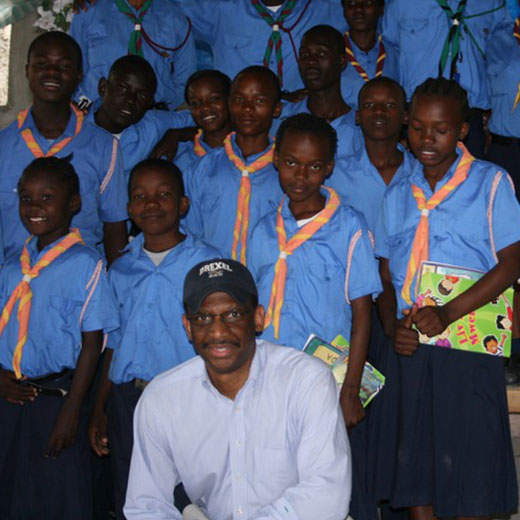
BD: What is most innovative about how tCHF is operating today?
JP: In November 2015, we launched the Digital Literacy Program (DLP). The Digital Literacy Program equips and helps prepare students for the 21st century. Most of the schools in Les Cayes, Haiti do not have one computer, much less computer science education, and this includes elementary schools, high schools and universities.
The DLP is designed to strengthen school children’s educational achievement through curriculum and lab experiences, helping students become technologically literate by the end of the 11th grade (or Secondary level). The students are introduced to a myriad of Microsoft tools such as Word, Excel and PowerPoint that can be used later in careers such as computer science, teaching, etc. Since the launch, we have observed that participation in the program brings pride to the students because they are the only ones in their family with access to a computer. This brings a great sense of hope. A secondary goal of the program also seeks to assist teachers in applying technology, educational data and research to enhance their classroom application.
BD: How has tCHF impacted your life personally?
JP: Through numerous interactions in Haiti, I have learned two valuable lessons. One is that poverty is not a respecter of person—it is a reality. Many suffer day-to-day through no fault of their own, simply because of where they were born or because they are unable to overcome unreasonable odds. Secondly, transformative change that embraces the education of children is fundamental.
BD: Can you tell us more about how tCHF measures the impact of its efforts?
JP: tCHF believes that it is very important to measure and evaluate the lasting impact of our work. Doing so allows us to continually optimize and improve our efforts. Student participation is monitored over the duration of the program. Students complete pre- and post-measures for each activity. Additionally, the effectiveness of the program is evaluated as a catalyst for integrating knowledge from all disciplines, which will contribute to the goal of increasing higher-level education for these students. Pre- and post-measures are used to assess the academic level of the students as a result of participation on the computer literacy course.
The overall goal of the program is communicated and evaluated by teachers and administrators. Lesson goals are developed for each lesson and communicated to the students. At the end of each session, an evaluation is made by the students and instructor to answer the question of whether or not objectives were met. Instructors and administrators are asked to weigh in on the effect of the project on the school’s academic curriculum as well as the students’ overall attitude. Students and teachers are encouraged and allowed to offer suggestions to improve the program. Curriculum changes, as well as delivery methods, are adjusted each semester to take into account evaluation results.
BD: Can you tell us how you inspire people to be their best?
JP: I wrote about servant leadership in a piece entitled “Uncommon Leadership”. The suggestions listed are those that I make use of with my own team at tCHF and at work. Treating every person, volunteer and employee with respect, supporting each to do meaningful work, leading by example and understanding that good intentions are not enough—behaviors count. “Do unto others as we would have them do unto you” is a principle most of us are familiar with. Many leaders have embraced this approach to leading with a servant attitude. However, it is not easy and requires giving of oneself and placing others first. It can be demanding and yet edifying.
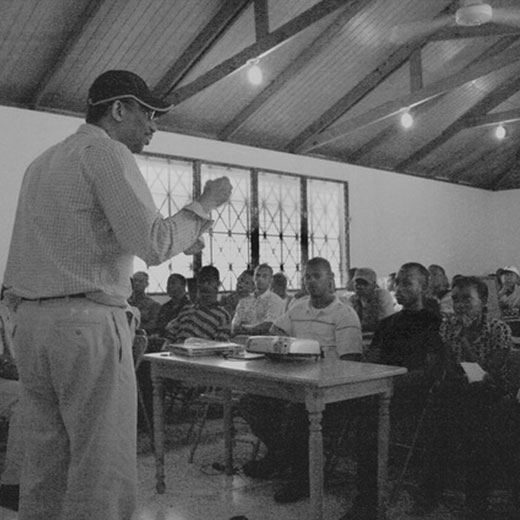
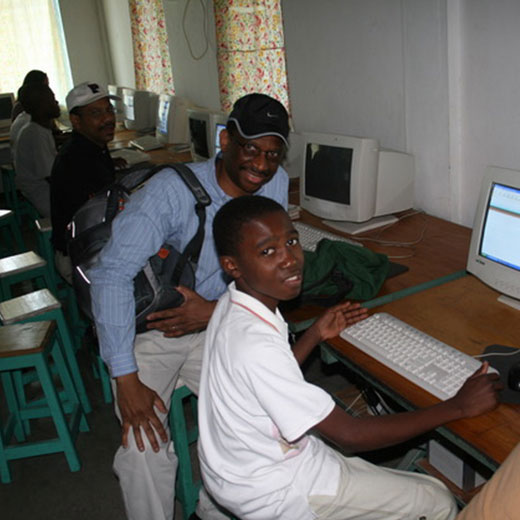
BD: What has tCHF taught you about hiring practices?
JP: This is an interesting question as it pertains to hiring in a country like Haiti. Finding people with the right skillsets is not an easy task.
In the U.S., new technologies and proxies to assist with the process exist and can be helpful to sift through the numerous candidates, yet these can also get in the way and affect the ability to attract top talent. By contrast, in Haiti, the recruiting and hiring process does not have many moving parts or involve many intermediaries. It is a simpler function, in part due to the economic situation, lack of jobs, skilled candidates and their over-willingness to want to work.
Due to these conditions, tCHF’s approach is straightforward. We stick to the plan and create positions with realistic requirements. Our recruiting process starts with a direct search for experienced people who are continuously learning or with a desire to learn new skills. The hiring process proceeds by giving applicants a realistic preview of what the job is like upfront. We do this for many reasons. We need the best people and, when hired, a buy-in on our long-term vision is mission critical. This is also a way to head off those who would end up being inadequate in the job. U.S. companies like Google and Marriott have found ways through gamification to provide those seeking jobs to get a preview of the work. tCHF does not have such a platform, but we do this by getting a person interested in working on location to volunteer with our team first or to help with installations of technologies in the Lab in Haiti. The result is always the same, we get the best through this sifting process. Those candidates who possess the combination of skills, trust and passion about our mission become long-term associates—those who don’t fit quickly, recognize it themselves early in the process.
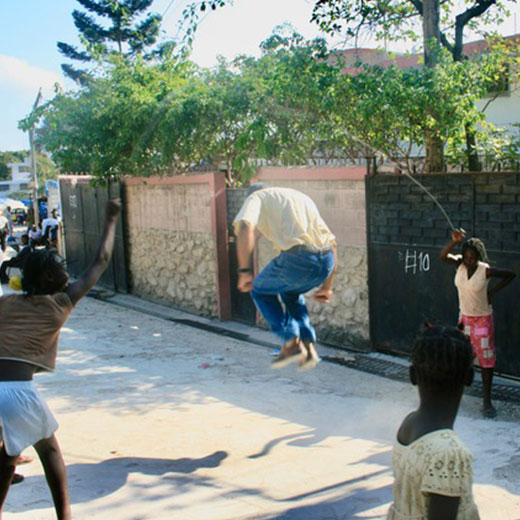
BD: Can you tell us about one of your favorite memories while traveling in Haiti?
JP: In 2007[EF1] , when my wife and I exited the plane on the tarmac in Port-au-Prince, the sight of the rugged mountains and the welcoming sounds from the trio of musicians altogether made our journey back to Haiti worthwhile. Surrounded by endless elevations and pristine beaches at its shores, we immediately knew that Haiti was a special place. Still, beneath the blue skies and the blanket of stars, poverty lurks and holds captive many of its residents. Years of natural disasters, such as hurricanes and earthquakes, have overwhelmed the country’s infrastructure and its people. As we drove through an open marketplace, street vendors and customers were fully engaged haggling and shouting, unmindful of our presence, cars and moped horns blowing incessantly added to the clatter—we were truly aliens caught in this web. My thoughts drifted. Here in the middle of a frantic market scene was the very essence of a determined and resilient people. Their condition does not stop them from going out each day to trade or find whatever work they can do to bring something home, no matter how small, in order to endure another day. Theirs is a poverty of circumstance, not character. There is a great lesson in this… one should never judge another unless one truly understands the experience of the individual being judged. This experience of our revisiting journey to Haiti has remained in our memories and motivates us in our efforts to help.
BD: What does joy mean to you? How do you find or cultivate it daily?
JP: This is a great question. I believe that joy is much more than an emotion evoked by well-being, success or good fortune as described by Merriam Webster. To me, as a Christian, it is achieved through complete confidence that God is ultimately in control of every detail of my life, that I can rely on my faith in Him and His everlasting love for me. Each day, I thank God for being with me, for me and in me—it is a choice, one that I live by every day.


Uncommon Person: Chad Hutson

Our Internal Learning & Impact at Bulldog Drummond

The One Decision by Employers in 2021 that Means Everything

What I Wish I Knew

Standing Up Inside

Uncommon Person: Gregg Imamoto

Five Things Every Company Should Know about ESG

Redefining Value

Uncommon Person: Chris Baréz-Brown

It’s Time For A Whole Lotta Common Good

Did You Choose Humanity?

Uncommon Partnership: Violux

Here’s How

Uncommon Person: Santhosh Nair

Designing Strategy For A Complex World

Responsibility & Relevance for Brands

